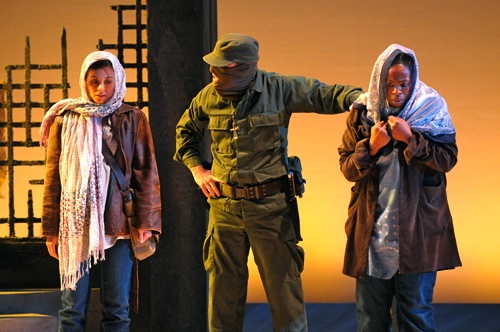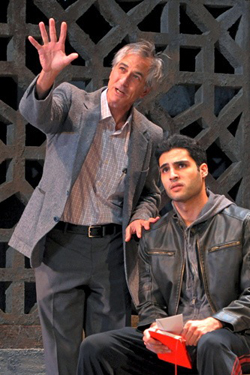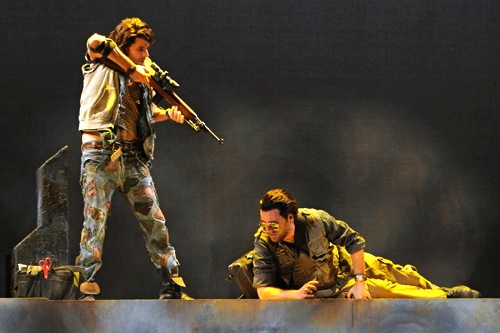
Marjan Neshat as Nawal, Manoel Feliciano as a thuggish militiaman and Omozé Idehenre as Nawal's friend in Scorched. Photos by Kevin Berne
How do you capture the chaos, anguish and tragedy of civil war, as well as its impact on individuals, within the limited canvas of the stage? That's the task the playwright Wajdi Mouawad set for himself in writing the epic drama Scorched, and the task that American Conservatory Theater assumed in bringing the play to the San Francisco stage.
Regrettably, the task outstrips the ability of Mouawad and ACT -- and probably anyone or any theater -- to accomplish. Blame that in large part on the intervention of technology and reality since the play's premiere in 2004: the ubiquitous smartphones that have taken us into the turmoil of Egypt, Libya, Syria and elsewhere in the Middle East, and instant views of civil war as they have never been shared before.
That's not to suggest that Scorched has no merit. Much of the tale is engrossing, tracing events that lead to a conclusion that is as appalling as it is surprising. Mouawad's inspiration came in part from the multiple conflicts within Lebanon, where he was born, and in part from Greek tragedy. Since 1983, when he emigrated to Quebec, the playwright has lived in Canada.
Mouawad's vehicle for examining horror, vengeance and love is the quest of a young man and young woman -- twins -- to understand their recently deceased mother, Nawal, and to learn why she did not speak to them or anyone else in the last five years of her life. Curiosity about one's ancestry may be normal, but this quest is bizarre.
For starters, twins Janine (Annie Purcell) and Simon (Babak Tafti) harbor little affection for Nawal, who treated them badly. They recoil from the strange demands contained in her will, which is read to them by an awkward, verbose notary (David Strathairn, who brings charm and wit to the peripheral role). Among those demands: that she be buried without coffin, clothing, ceremony or headstone, and that the children deliver two letters. One is addressed to the father that they believed to be dead, the other to a brother whose existence was unknown to them. Both men must be found in the land from which Nawal fled.
 David Strathairn and Babak Tafti: Counsel to a confused young man
David Strathairn and Babak Tafti: Counsel to a confused young man
Janine, a professor of mathematics, is the first to capitulate, after explaining her reasoning via a geometric puzzle. (Unlike Tom Stoppard in Arcadia, for example, Mouawad hasn't found a way to give compelling theatrical form to a scientific premise.) Her journey sets in motion a series of encounters and flashbacks that carry the drama across some five decades, through events that test the capacity to survive.
Simon, a hot-tempered amateur boxer, eventually follows and joins Janine's search.
We meet Nawal (Marjan Neshat) as a pregnant 14-year-old who is forced to give up her newborn son, presumably to preserve family honor, then follow as she tries for decades to reconnect with the child and later with the man he has beome.
Her search ranges through civil wars that are defined by random killing rather than the pursuit of some political end: The most disturbing incidents -- and theatrical coups -- include the murder of all occupants of a bus, just after Nawal leaves it, and a killing committed by a rock 'n roll-loving sniper who revels in taking close-up portraits of his victims. (ACT could have provided the sniper with a weapon more menacing than a World War II carbine.)
The experiences eventually prompt Nawal to take up arms, assassinate a militia leader, and land in a prison that is particularly hellish for women. Rape, of course, is standard practice.

Nick Gabriel as a psychopathic sniper, Manoel Feliciano as his next victim
In summary, the story is horrifying. In director Carey Perloff's staging, the events and personalities rarely connect at an emotional level.
The casting of Neshat to play Nawal from 14 to about 40 is particularly questionable, as well as flat. Other productions have used two performers to establish the difference in age and attitude, apparently with greater success. And the representation of Nawal at 60, when she goes through moments of ferocious epiphany, comes across with declamatory remoteness as played by Jacqueline Antaramian.
Neither brings the central role of Nawal any passion and power comparable to that of Omozé Idehenre, as a fellow refugee from Nawal's destroyed village who joins in her years of search for the boy.
Manoel Feliciano, Nick Gabriel and Apollo Dukakis fill 10 roles with competence, though I can't understand the gain created by the cross-gender casting of Dukakis as Nawal's dying grandmother and Antaramian as a bearded old man.
Scorched runs through March 11 at American Conservatory Theater, 415 Geary St., San Francisco. Tickets are $10-$100, from (415) 749-2288 or www.act-sf.org.